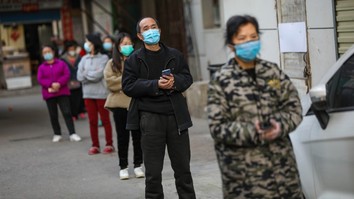PESHAWAR -- Residents of the newly merged tribal districts are maintaining measures aimed at overcoming the novel coronavirus following the success of public awareness campaigns, say officials.
"At the beginning of the pandemic, the majority of residents of Jamrud and Khyber District were not taking it seriously, but through awareness campaigns, locals realised the potential threat and began following precautionary measures," said Naseer Ahmad, the tehsil municipal officer (TMO) of Jamrud.
Because of the collective efforts of the tehsil administration and locals, the pandemic infected only 30% of the population of Jamrud, he said, praising the co-operation of residents. Authorities had expected an even higher rate of infections there.
The provincial government ordered the implementation of standard operating procedures (SOPs) to halt the spread of COVID-19, according to Ahmad.
![Jamrud residents September 9 wash their hands at a station installed by the TMA. [Danish Yousafzai]](/cnmi_pf/images/2020/09/28/26192-covid1-585_329.jpg)
Jamrud residents September 9 wash their hands at a station installed by the TMA. [Danish Yousafzai]
![TMA workers September 9 put up posters in Ladha as part of a COVID-19 awareness campaign. [Danish Yousafzai]](/cnmi_pf/images/2020/09/28/26194-covid3-585_329.jpg)
TMA workers September 9 put up posters in Ladha as part of a COVID-19 awareness campaign. [Danish Yousafzai]
In the first stage, it launched a mass awareness campaign for the general public in order to educate and sensitise it on the threat of the coronavirus.
"We installed loudspeakers on different vehicles and announced public-service messages for their safety and awareness," Ahmad said.
The Tehsil Municipal Authority (TMA) of Jamrud established handwashing stations at different locations and distributed face masks, soaps and sanitiser, he said.
"We advised them to stay home for their safety," he added. "We told them that the virus is ruthless, that it can kill the whole family and that precaution is the only way to stay safe."
Monitoring movement at the Torkham border crossing was difficult, but the local administration overcame the challenge with support from the provincial government, said Ahmad.
"Affected and suspected patients in Jamrud Tehsil happily quarantined themselves," he added. "It was the result of a successful awareness campaign."
The public is still following precautionary measures because the deadly virus has not disappeared, he said.
A positive response to COVID-19
COVID-19 cases in Pakistan decreased in August, but a resurgence this month has caused alarm.
As of Monday (September 28), the virus has infected 37,701 individuals in KP and killed 1,259.
Still, in Ladha, South Waziristan District, no residents have contracted the coronavirus to date, according to Majid Khattak, the local TMO.
Locals obeyed and enforced all the guidelines suggested by authorities once the KP government declared an emergency at the start of the pandemic, he said.
Local authorities distributed awareness materials and engaged with community elders and clerics, Khattak said.
"They were the most influential personalities in the community," he said. "Masses listen to them. We received a very positive response."
Saleem Khan, a 24-year-old resident of Ladha, said that he was scared to learn on television that the virus had reached Pakistan.
"All the villagers were terrified. Everyone was discussing the deadly virus. But TMA officials taught us how to defeat this virus," he said.
TMA sprayed disinfectant solution on all streets and roads of Ladha, said Khan. "The elders told us to discontinue handshaking for some time."
TMA teams in different districts of the merged areas are working hard to educate and protect the masses from the coronavirus, said Deputy Director Local Governance School KP Asad Ullah Khan, adding that locals are showing resilience and co-operating with local authorities.
The COVID-19 mortality rate in the newly merged districts is low compared with that in the rest of the country, but as the number of positive cases is rising again, officials cannot declare that the coronavirus is gone, said Khan.
A large number of cases have occurred in neighbouring India, which is an alarming situation for Pakistan, he added.
The KP Local Government, Elections and Rural Development Department, with the collaboration of donor agencies, is providing special training to local administrations of the merged districts to prepare them for a second wave of the coronavirus, said Khan.
"We must strongly follow the SOPs at business centres, markets and other public places across the province because there is a chance that a second wave might hit us too."
Outbreak tied to Iran
Many Pakistanis blame Iran's recklessness for the spread of COVID-19 in their country.
The first two cases of COVID-19 in Iran became public knowledge on February 26.
At the start of the pandemic in February, Iranian authorities deported hundreds of Pakistani pilgrims without testing them for the virus, resulting in transmission to the local Pakistani population.
By April, 51% of those infected in Pakistan could be traced back to those pilgrims.
Meanwhile, the Chinese and Russian regimes continue to spread disinformation regarding the pandemic.
Beijing increasingly has turned to an aggressive, conspiratorial type of disinformation during the coronavirus pandemic, according to a report published by the US Council on Foreign Relations on September 10.
"Beijing is both manipulating factual information and spreading disinformation -- or willfully false information -- to distract from the origins of the virus, highlight the failures of the United States, and promote China as a global leader," said the report.
For its part, the US government in July, through the US Agency for International Development and in co-operation with Pakistan's National Disaster Management Authority, donated 100 new, state-of-the-art ventilators to support Pakistan in its fight against COVID-19.
The ventilators arrived in Karachi on July 2 and were headed for hospitals across Pakistan. This donation supports Pakistan's urgent response to the pandemic, the US embassy in Islamabad said in a statement.

![Majid Khattak, the TMO of Ladha, September 8 distributes pamphlets in the main local market to inform shopkeepers about the pandemic. [Danish Yousafzai]](/cnmi_pf/images/2020/09/28/26193-covid2-585_329.jpg)






